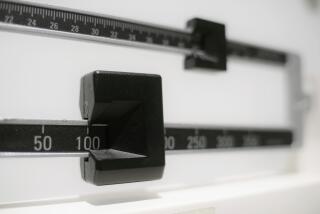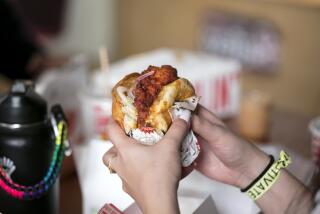It’s eating no matter how you slice it
- Share via
What’s the official word on letting your mouth stray beyond the breakfast-lunch-dinner circuit? Scientists have yet to figure it out.
For one, snacking is tough to study. Try giving volunteers their meals in a controlled lab setting, and they don’t eat close to how they would normally. Ask them to try to remember what they ate yesterday in the real world, and they’ll likely be way off in their reports -- either because they don’t remember or because they don’t want to remember.
There are always the easier-to-study rats, of course. But when it comes to nutrition, we’re just not rodents. Rats are surprisingly determined to keep up healthy habits -- including watching calories. Sure, they’ll accept snacks, but then they’ll eat less rat chow later on.
Studies have shown that humans haven’t learned that trick. Give us potato chips during the day, and we’ll gratefully scarf them down -- and then go on to eat a full dinner at night. (Scientists aren’t sure why we do this -- or, more important, how to get us to stop.)
One thing is clear: Snacking is still eating. So if you’re going to snack, here are some thoughts about how to do it more wisely.
* Don’t underestimate how junk food messes with normal willpower. “Our body appears to be good at regulating our food intake when only healthy foods are available,” says Kelly Brownell, director of Yale’s Rudd Center for Food Policy & Obesity. “But once you introduce high-fat, high-calorie foods, all bets are off. Foods high in sugar, fat and calories appear to throw off the body’s normal regulatory ability.”
A 2005 study at Penn State University found a high-fat diet might dampen normal responses to “stop-eating” chemicals in the gut. Rats fed high-fat chow for normal meals reacted abnormally to a hormone called cholecystokinin -- also found in humans -- which triggers feelings of fullness and helps the brain to decide when to stop eating. Rats fed high-fat chow ended up ignoring the signals and ate 40% more high-calorie snacks than normal-chow rats.
The upshot (if this experiment were to apply similarly in humans): If your everyday diet is high in fat, your normal appetite signals might have gone awry, leaving you more susceptible to snacking urges that others can more easily resist.
* Try reprogramming yourself. “You can, in fact, change your tastes and expectations,” says Margo Wootan, nutrition policy director at the Center for Science in the Public Interest. “If you’re used to eating fruits and vegetables for snacks, that’s what you’ll begin to crave. Save the Doritos and the cookies for a real treat instead.”
* Watch out for the stress -- even after it has faded. Studies have shown that people eat more while under stress. But a 2004 study at Penn State University found that women also ate more in the aftermath of stress -- in this case, hearing extremely loud noises while trying to do math problems. The effects, which extended to women but not men, included eating significantly more fatty potato chips, chocolate, cheese and even bland popcorn.
* Remember that there’s no one way to eat healthfully. “Snacking is complicated,” says Barbara Rolls, author of “The Volumetrics Weight-Control Plan” and professor of nutritional sciences at Penn State University. “You can never prescribe the same number of meals for everybody across the board. If you know you get a gnawing stomach between meals, then at least plan ahead and have some healthy food ready to eat.”
* Try thinking of food as meal extensions, not snacks. “Vending machines are the major culprit in allowing us to eat between meals and consume more calories,” says David Levitsky, professor of nutrition and psychology at Cornell University. “Nutritious foods are often found in meals. Vending machines dispense snack foods, not meal foods.” He suggests eating a bit of leftovers from lunch, veggies from home or a cup of soup, which has satisfying volume and is warm to boot.
* Watch out for health halos. Just because a food may be good in one sense -- low sodium, high fiber, for instance -- doesn’t necessarily make it good in lots of other ways -- low in calories or sugar, for instance. That good-for-you aura can fool people into making bad decisions.
“People think low-fat snack foods are a lot lower in calories than they are,” says Brian Wansink, author of “Mindless Eating: Why We Eat More Than We Think” and director of the Food and Brand Lab at Cornell University. In a test at his lab last year, people given granola with low-fat labels underestimated how many calories they would save, and they ate 35% more calories than they did of the regular version.
* Beware late-night snacking quirks. If you’re habitually eating in the wee morning hours when you should be in bed, you might be reprogramming your brain. A 2006 study at University of Texas Southwestern Medical Center in Dallas found that late-night eating habits triggered genetic changes in rats’ brains. When rats learned to expect snacks at times they’d otherwise be sleeping, their body clocks flipped. Sleep/wake genes in the rats’ brains became in sync with the snack, and the rats started to ignore normal cues of when to sleep -- even after the snacks stopped coming.
* Keep the snacks out of sight. “Anything that creates a pause is enough to interrupt mindless eating,” Wansink says. One study of office workers’ habits revealed that the number of visits to the vending machine was inversely correlated with distance from one’s desk. The closer the machine, the easier it was to nip over for a quick purchase.
* Just because you can snack doesn’t mean that you must. “The food industry has successfully reset the definition of when it is acceptable to eat,” Brownell says. More opportunities aren’t necessarily good. “If we’re going to eat seven times a day, we’re just exposing ourselves to more food,” Rolls says. “And if we’re around food, it’s hard to stop.”
* Just deal with a bit of hunger. “Snacking is now normal, but people used to just wait for meals,” says Marion Nestle, nutrition professor at New York University and author of “What to Eat.” “Now people feel they should never be hungry.”
Indeed, our species is designed to feed and then fast, says Susan Roberts of the Friedman School of Nutrition Science and Policy at Tufts University. “Humans have a stomach to act as a reservoir. We’re not ruminants that need to eat around the clock to get enough in.”






